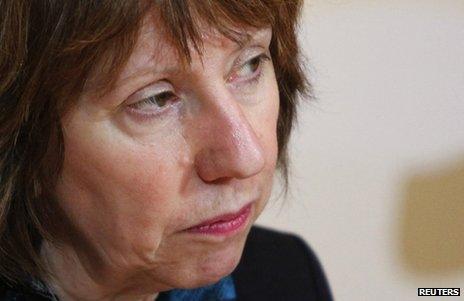Iran nuclear: Ashton says positions 'still far apart'
- Published
- comments

Baroness Ashton said positions were "far apart"
Talks between world powers and Iran on its nuclear programme have ended without agreement, with the EU saying their positions "remain far apart".
Over two days of talks in Almaty, Iran was asked to give up work on its most sensitive nuclear activities in return for an easing of sanctions.
Iran said it was up to the world powers to demonstrate willingness to take confidence-building steps.
World powers suspect Iran of a covert nuclear weapons programme.
Tehran, which insists its intentions are peaceful, is negotiating with the so-called P5+1 group comprising the five permanent members of the UN Security Council - the US, Russia, China, the UK and France - plus Germany.
'No breakthrough'
EU foreign policy chief Catherine Ashton confirmed no deal was reached.
"It became clear that the positions... remain far apart on the substance," she told reporters on Saturday.
"We have therefore agreed that all sides will go back to [their] capitals to evaluate where we stand in the process," she added.
"I think the first hurdle is take the proposal that we put on the table and get a real response to all of it... The challenge is to get real engagement so that we can move forward with this."
Russian Deputy Foreign Minister Sergei Ryabkov confirmed there had been a "lack of results".
"Unfortunately we were unable to achieve a breakthrough and are still on the threshold," he was quoted as saying by Russia's Interfax news agency.
According to AFP news agency, he also said no time or place for the next talks had yet been agreed.
Tehran's chief negotiator, Saeed Jalili, was quoted as saying by Reuters news agency: "We proposed our plan of action and the other party was not ready and they asked for some time to study the idea."
At a previous round of talks in Kazakhstan in February, the P5+1 tried to push Tehran to halt production and stockpiling of uranium enriched to 20%.
The P5+1 also demanded Iran shut down the Fordo underground enrichment facility.
In return, the world powers suggested easing tough economic sanctions imposed on Iran in response to its nuclear programme.
Iran's economy has been squeezed, with oil revenue slashed, the currency nose-diving in value and unemployment growing.